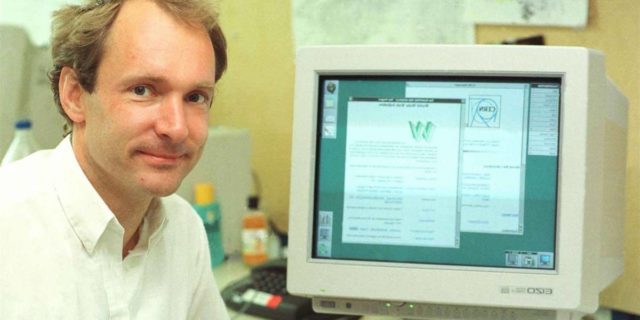The World Wide Web (WWW), or global computing network, celebrates its 30th anniversary in March 2019. But the presence of false news and the influence of social networks have led its creator, Tim Berners-Lee, to launch a campaign to “save it”.
In 1989, Berners-Lee, a young physicist who worked at the CERN calculation center (a European nuclear research organization), near Geneva, envisioned a “decentralized information management system”, the first step towards the current web.

30 years later, in what was his office, only a commemorative plaque and an extract from the yearbook of CERN remember that historical moment. “Tim worked a lot; the light was always on at his office”, said François Flückiger. After Berners-Lee went to the MIT institute in the United States in 1994, he took over the technical direction of the web at the CERN.
Tim Berners-Lee was in charge of the CERN internet yearbook but, at the same time, he was also looking for a system so that the thousands of scientists scattered around the world could share their research remotely. “From the beginning, the planetary dimension was present. Immediately we had the feeling that the story was being written, “even though a superior said it was a” vague “project, Flückiger recalls.
In 1990, the Belgian Robert Cailliau joined Berners-Lee to contribute to the promotion of his invention, based on the HTML language (which allows creating web pages), the HTTP hypertext exchange protocol (which allows users to request and then receive a web page), and the URLs.
In the late 1990s, Berners-Lee launched the first CERN web server and web browser. Since then, this network has allowed “a huge amount of human activities to flourish”, says Ian Milligan, a professor specialized in the study of the archives of the University of Waterloo’s website in Canada.
“An uncontrolled monster”
Flückiger, now retired, considers that the web is one of the 3 greatest inventions of the 20th century that make up the digital society, together with IP technology and Google‘s search algorithms. But with “digital harassment, the ‘fake news’, the hysterization of the masses (…), one wonders if we have not finally created an uncontrolled monster”, he says, lamenting the exhibition of private life on the web and the predominance of the “beliefs” versus the “knowledge”.
According to Niels Brügger, director of the Center for Internet Studies in Denmark, it is normal that “once a technology is made available to users begin to modify it and develop it to respond to new needs”. Last January, the Secretary-General of the UN, Antonio Guterres, asked at the World Economic Forum in Davos for a regulation of the web and regretted that some countries use it to violate human rights.
Tim Berners-Lee himself has launched a campaign to “save the web” and calls for the creation in 2019 of a “Contract for the Web” based on access for everyone and respecting privacy. “The Web has been corrupted by scammers and trolls”, Berners-Lee wrote in an article published by the New York Times, on December 6th, 2018. In 1993, CERN made the program of the web publicly available, which allowed everyone to use it freely.
A year later, in 1994, Flückiger decided, however, to launch a new version of the program, in “open source”. Thus the CERN retained the copyright but gave everyone the right to use it and modify it freely and without costs.


